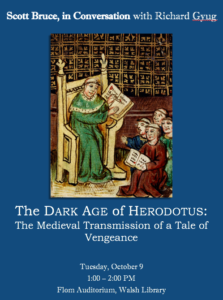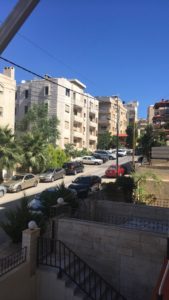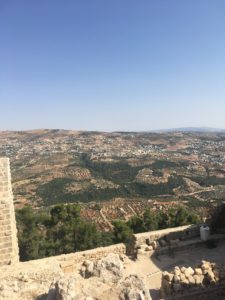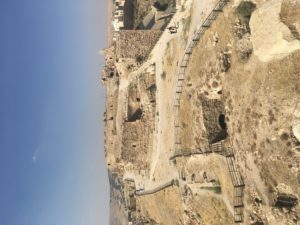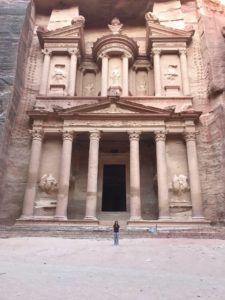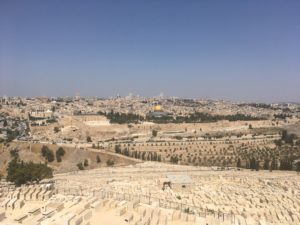On October 9th Dr. Scott Bruce, who recently joined Fordham’s History Department, sat down with Dr. Richard Gyug, Professor Emeritus of History and Medieval Studies, to discuss Dr. Bruce’s forthcoming article in Speculum, titled “The Dark Age of Herodotus: Shards of a Fugitive History in Early Medieval Europe.”
Drs. Scott Bruce and Richard Gyug discuss ‘shards’ of antiquity in the Middle Ages
Comments Off on Drs. Scott Bruce and Richard Gyug discuss ‘shards’ of antiquity in the Middle Ages
Filed under Department Events, Events, Faculty News, New Course
Teresa Fiore visits from Montclair State University This Wednesday!
Comments Off on Teresa Fiore visits from Montclair State University This Wednesday!
Filed under Department Events
Postcard from Spain… PhD candidate Rachel Podd reports on her research.
We’re happy to hear from Rachel Podd in this postcard she sent about her research in Spain this Summer. Rachel is a Ph.D candidate in the History department and helps lead undergraduates on el Camino de Santiago every spring. This summer she stayed after walking the camino to work on her own research. Rachel writes:
Comments Off on Postcard from Spain… PhD candidate Rachel Podd reports on her research.
Filed under Grad Student News, Postcards, Uncategorized
First O’Connell Initiative Event of the Semester!
WHO: Dr. Johan Mathew, Rutgers University.
WHAT: “Unveiling Money: Counterfeits, Arbitrage, and Finance across the Arabian Sea”, based on Dr. Mathew’s recent book Margins of the Market: Trafficking and Capitalism Across the Arabian Sea (University of California Press, 2016).
WHEN: October 17 at 5:30 pm
WHERE: South Lounge, Lincoln Center Campus
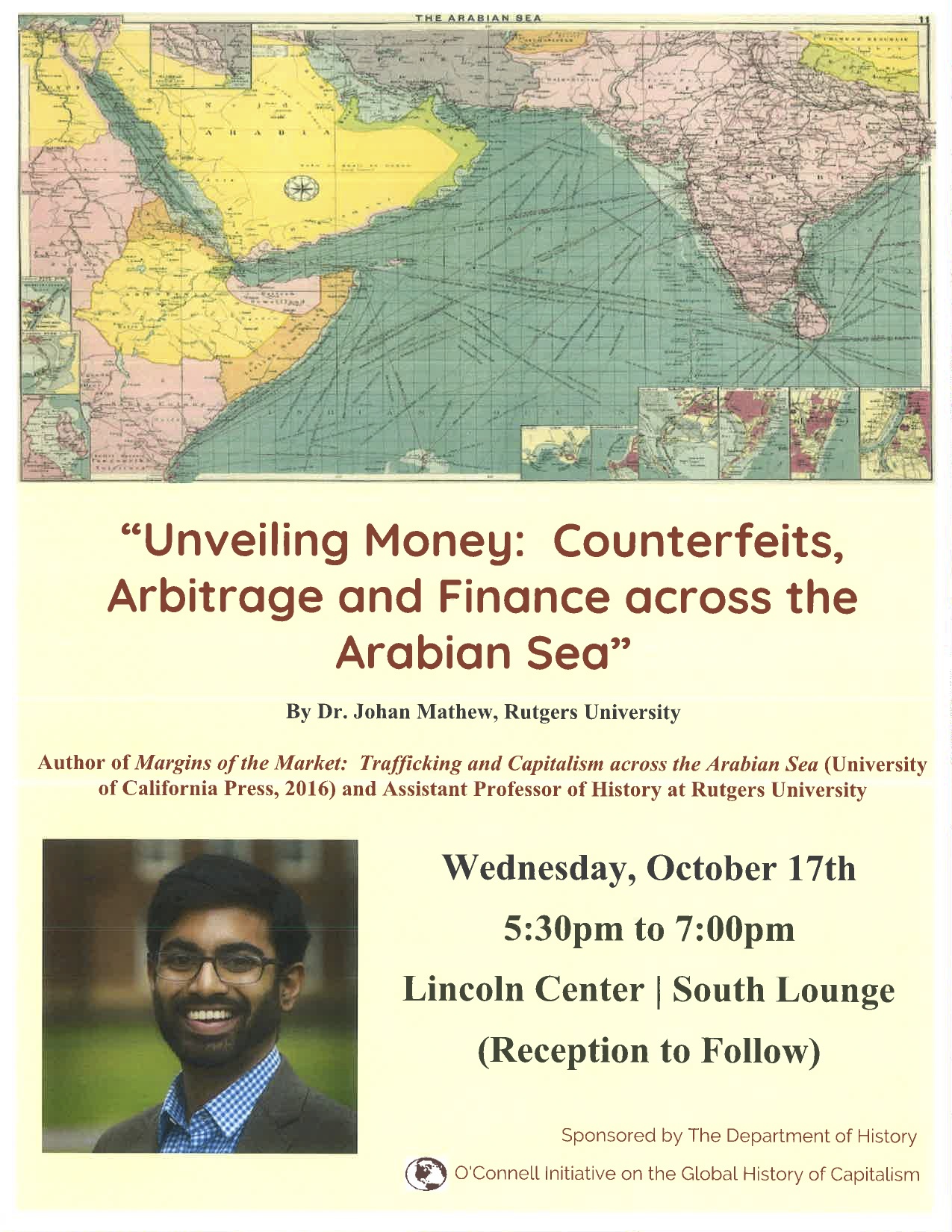
Comments Off on First O’Connell Initiative Event of the Semester!
Filed under Uncategorized
OCTOBER 9th! Informal Talk Given by Scott Bruce with Richard Gyug
Comments Off on OCTOBER 9th! Informal Talk Given by Scott Bruce with Richard Gyug
September 25, 2018 · 7:42 pmFaculty Search: African History !
Colonial and/or Post-Colonial Sub-Saharan Africa: Fordham University solicits applications for a full-time, tenure-track position at the rank of assistant professor in colonial and/or post-colonial sub-Saharan African history. Applications should include a CV, three recommendations, a writing sample, and a teaching portfolio (with sample syllabi and a teaching statement), and should be submitted through Interfolio (https://apply.interfolio.com/
55059) by 1 December 2018. The successful candidate should have the PhD in hand by August 2019. Questions should be directed to the Chair of the Search Committee, Prof. Daniel Soyer, at soyer@fordham.edu. Fordham is an independent, Catholic University in the Jesuit tradition that welcomes applications from all backgrounds. Fordham is an equal opportunity employer.
Comments Off on Faculty Search: African History !
Filed under Teaching
Postcard from Qasid Arabic Institute!
Amanda Racine, a PhD student in Medieval History, sent this postcard about her experience this past summer in Jordan studying Classical Arabic.
With the support of the GSAS Student Support Grant and the Joseph R. Leahey Fellowship both from Fordham, I traveled to Amman, Jordan this summer to study Classical Arabic at Qasid Arabic Institute. In addition to the grants from Fordham, I received a CARA Summer Tuition Grant from the Medieval Academy of America.
View from outside of my flat in Amman
Amman is an amazing city and Jordanians are extremely friendly and welcoming. Exploring Amman was really enjoyable (especially after learning how to navigate the taxi system.) My lessons at Qasid consisted of four hours of grammar lessons a day (Sunday-Thursday) and additional lessons focused on pronunciation. It was a really intensive course but my classmates and teachers made it a joy to attend. My teachers had lived in Jordan their whole lives and were wonderful resources not only for Arabic, but also for where to find the best food in Amman!
Qasid: My class with our ustadhas (teachers)
When I was not in class, I was able to spend some time traveling around Jordan. Although not a major hub of crusader settlements in the twelfth and thirteenth century, there are a number of castles built during the crusades that now lie within Jordan’s borders. I visited Ajloun (one of the few Muslim fortresses), Shoubak, and Kerak. There were a number of Roman ruins located in right in the heart of Amman as well. I also visited one of Jordan’s most famous sites, Petra. The most famous part of Petra, the Treasury, was certainly awesome, but I most enjoyed exploring the narrow passageways and the views from the high cliffs.
The view from قلعة عجلون (Ajloun Castle) a twelfth-century Muslim fortress in Jordan
Arabic script on the ruins of قلعة شوبك (Shoubak Castle)
Inside قلعة كرك (Kerak Castle) a twelfth-century crusader castle in Jordan
Built c. 4th century BCE, Petra is Jordan’s most famous site
I was also able to make one short trip to Jerusalem. In Jerusalem I met with some crusade scholars who live in the region and walked around the Old City. It was an exciting combination of being able to hear about some of the research being done in the area and then actually be able to visit the places that we discussed.
View of the Old City from the Mount of Olives
Overall, my summer in Amman was a valuable experience. This was my first time in the Middle East and as someone who studies the Latin East in the twelfth and thirteenth centuries it was amazing to get a better sense of the landscape (soo many hills!) and culture of the region. I was able to not only build a solid foundation in Arabic but also meet some really wonderful people. I look forward to continuing my studies in Arabic and hope to return to to Jordan again soon. إن شاء الله.
Comments Off on Postcard from Qasid Arabic Institute!
Filed under Grad Student News, Postcards
Graduate Students: Recent Publication
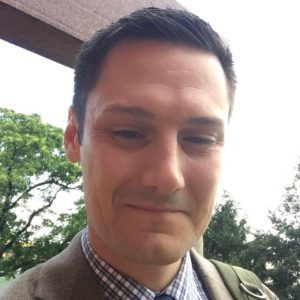
Ronald Braasch
Ronald Braasch recently published an article titled: “The Skirmish: A Statistical Analysis of Minor Combats During the Hundred Years’ War, 1337-1453”in the Journal of Medieval Military History XVI (June, 2018). Ron is seeking to shed light on a neglected aspect of medieval warfare and discover what impact these smaller fights had on the conduct of warfare during the Hundred Years’ War. Skirmishes existed somewhere between a battle and duel, occurred during all varieties of locations and environments, and formed an integral martial function between medieval combatants. Moreover, skirmishes were a common feature during the Hundred Years’ War as the chroniclers wrote so much about them. As a case study, Ron’s work examines the chronicles of Jean le Bel, Jean Froissart, Enguerrand de Monstrelet, and Matthieu d’Escouchy, whose narratives collectively span the entirety of the conflict. By examining chronicles quantitatively, Ron’s research indicates that the outcomes of skirmishes could influence the strategies of military leaders and that indiscipline was a key component in French military losses against English, Burgundian, and various other opponents. Ron is entering the first year of his PhD in History, where he is studying the roles of combat support personnel in the armies of Edward III.
Full Citation: “The Skirmish: A Statistical Analysis of Minor Combats During the Hundred Years’ War, 1337-1453.”Journal of Medieval Military History XVI, (June, 2018): 123-157.
Comments Off on Graduate Students: Recent Publication
Filed under Grad Student News, Publications
Letter on Teaching, from one of our Recent Alumnus of History
History Department Friends,
On a rainy Friday afternoon in January 2017, I had quite the decision to make: to accept a position teaching Asian and European history at The Derryfield School (DS)—an independent college preparatory school in Manchester, New Hampshire—or fly to Florida (on Monday!) for a campus interview for an assistant professorship at a state college. I chose Derryfield that evening and moved to Concord, NH with my family that summer. A year and a half later, I cannot emphasize enough how excited I am about my decision. In this regard, I want to share my experience with the History Department and encourage current doctoral students who are falling in love with teaching to consider pursuing positions at both the prep school and university level.
Throughout the course of my time at Fordham, I was very fortunate to have had the opportunity to teach extensively at the Rose Hill and Westchester campuses. In the process, I came to realize just how much I love being in the classroom and engaging with driven young people. I felt gratified by my academic success in publishing peer-reviewed articles and giving talks on my scholarship (I am still proud of my presentation at The Korea Society!) But increasingly, what excited me the most was how I felt after leaving the classroom each day—the electric buzz of debates about ethical dilemmas in history, of competing views about the significance of personal subjectivity in analyzing ordinary and extraordinary times.
As I approached graduating with my Ph.D. in May 2016, this passion drove me to pursue positions at prep schools and colleges as I considered how to best make teaching the centerpiece of my academic career.
As I now teach at Derryfield, my days are filled with endless historical debates with thoughtful and enthusiastic young people. The youth of high school students—quite different from teaching college juniors and seniors!—fosters an exciting classroom environment. At the dawn of their formative years, my students prove unusually open to taking risks with their ideas; they lack an intellectual self-consciousness that sometimes constrains debates in higher education. With this appreciation, I have found the energy of adolescents inspiring; the pot boils, so to speak. I use diverse primary sources (period music, memoirs, films etc.) and frequent debates (mock U.S.-DPRK nuclear negotiations!) to encourage that vibrant environment. I take pride as teenagers learn to think critically, but also to feel history and empathize with the humanity of individuals in the past and present.
In terms of scholarship, I am enjoying the opportunity this summer to read and write on topics related and unrelated to my area of expertise in US-DPRK relations. I have, for example, been writing on US foreign policy with Iran and North Korea in my local newspaper, the Concord Monitor, in an effort to shape such conversations at a grassroots level. (Links to my most recent pieces below.) I have two forthcoming book reviews coming out with the Journal of American-East Asian Relations. In addition, I am currently beginning a book project, focusing on key historical events in the early personal lives of deplorable dictators (See the short story “Genesis and Catastrophe: A True Story” by Roald Dahl, and you’ll understand).
Fordham and the History Department (as well as Beth Knobel in the communications department!) enabled me to gain indispensable teaching experience and allowed me to discover my passion for teaching. I remain thankful, moreover, for having had the opportunity to learn from a master pedagogue like Elaine Crane. (I’ll never forget Dr. Crane’s admonishment in the “Teaching History” course when I used the word “plethora.” “Use straightforward language! No one is impressed with your GRE vocabulary!” Dr. Crane stated in her oh-so-gentle manner of speaking for which she is deservedly celebrated.)
As doctoral students move towards the completion of their programs and begin to pursue professorships at the university level, I strongly encourage them—if teaching is a true passion—to consider positions at the prep school level as well. I would be happy to discuss such a path with anyone who is interested.
With appreciation,
Brandon K. Gauthier, Ph.D.
“A win for Kim,” Concord Monitor, June 15, 2018
http://www.concordmonitor.com/A-win-for-North-Korea-and-perhaps-peace-18192740
“North Korea’s games,” Concord Monitor, June 4, 2018
http://www.concordmonitor.com/US-and-North-Korea-17936206
“Why would anyone trust the US?” Concord Monitor, May 12, 2018
http://www.concordmonitor.com/Why-would-anyone-sign-a-deal-with-the-US-17447195
Comments Off on Letter on Teaching, from one of our Recent Alumnus of History
Filed under Alumni News
Translations of Crusade Texts by Graduate Students
History PhD student Patrick DeBrosse has recently made his translation of The Song of the Siege of Acre available on crusaderstates.org. Patrick translated this Latin poetic account of the Third Crusade as part of his MA thesis at the University of East Anglia. His thesis sought to challenge previous scholarship on the poem’s composition and to elaborate upon the poem’s historical and literary significance. For the Crusader States website, Patrick has revised his translation, written an introduction that explains his views on the poem’s origins and significance, and added footnotes to guide readers through the narrative action.
The poem is of particular importance to scholars of the crusades, since it was composed by an eyewitness who completed it in 1190, prior to the surrender of Acre. The Song thus reveals the attitudes of a Christian crusader who was unaware of events to come, and gripped by feelings of loss, fear, hope, and uncertainty. The poet offers many unique details about the conflict, and his desire to write in verse illustrates the uses of poetry within twelfth-century society. Patrick has attempted to translate the original elegiac couplets as literally as possible, proceeding couplet-by-couplet and retaining the poet’s original idioms.
The translation is available for free at www.crusaderstates.org where it is hoped that it can reach a wide audience of both scholars and non-scholars.
Comments Off on Translations of Crusade Texts by Graduate Students
Filed under Grad Student News


